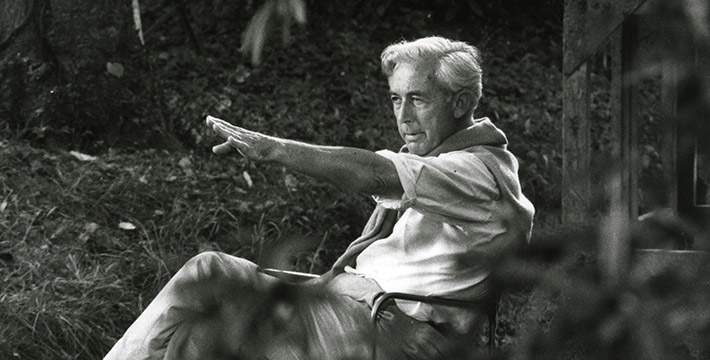He is one of the most important names of intellectual cinema: Who is Robert Bresson?
Bresson is a Catholic, intellectual and elitist filmmaker.

French film director. He was born on September 25, 1907, in Auvergne. After a childhood spent between his birthplace and Paris, he received an education in Greek, Latin, and philosophy, where he excelled. He has a doctorate in literature and philosophy. Interested in painting. He made a medium-length film in 1934, wrote screenplays for various directors, and assisted Rene Clair. After the outbreak of World War II, Bresson stopped these activities and returned after spending eighteen months as a prisoner of war.
Bresson considers Les anges dupeche ("The Angels of the Sins"), which he shot in 1943, the first film of his directorial career. The film, which was about the religious and moral tensions in a monastery, had limited commercial success, and in 1945 he had the opportunity to shoot his second film, Les dames du Bois du Boulogne ("The Ladies of the Boulogne Forest"). Based on a story by Diderot, the film, which deals with "love morality", was not well received despite Maria Casares' beautiful play. That's why the director was only able to shoot his third film, Le journal d'un cure de campagne ("The Diary of a Village Priest") in 1956. The film was based on a novel by Georges Bernanos, the writer who the director draws most often from. For the first time, Bresson uses his actors as tools, almost as secondary elements of the film. His language is distant, mental, and unattended.
Un corıdamne a mort s'est echappe ("A Sentence Escaped"), which he made in 1956 after a few interrupted projects, is considered to be Bresson's first film with full success. In this movie, the visual transfer of what went through the mind of the movie hero was carried out with great competence. Three years later, Pickpocket was inspired by something similar to that of another writer, Dostoevsky's Crime and Punishment, which Bresson adored. Bresson's detail shots, which were integral in themselves without contradicting the editing, were first used effectively in this film. This and the director's stagnation of movement made the film a work that some people liked and others criticized. The second element is particularly relevant in Le Proces de Jeanne d'Arc ("The Trial of Jan Dark") of 1962. It has been suggested that the use of actors and detail shots in this film achieves great visual refinement. However, the fact that the previous cycles of the subject were also very successful prevented the film from getting the attention it deserved.
Four years later, Au hasard Balthasar (“Our Donkey Balthasar”) was a French-Swedish co-production. In the film shot in the Alps, all kinds of human cruelty to the donkey Balthasar was a symbolic message. The humanitarianism of this film, which is more open than in Bresson's other films, is also seen in Mouchette of 1966.
In 1974, Bresson made his long-awaited Lancelot du lac movie. Part of the Arthurian legends, the subject was based on the search for the sacred bowl that Jesus used at the last supper. Bresson was creating a Middle Ages based on his visual terms, ending the film at the point where this desperate quest was abandoned. Critics are in complete agreement that this film is one of his most mature works.
Three years later, with Le Diable probablement (“The Devil Probably”), the director returned to Paris to address the pessimism of the younger generation regarding the problems of the contemporary world. The film has been criticized for its problematic being multidimensional and Bresson's pessimism peculiar to the older generation failing to address all of these dimensions. Bresson's latest film (1983) is L'Argent'âir ("Money"), also based on Dostoevsky.
Bresson is a Catholic, intellectual and elitist filmmaker. The main theme in his films is the human existence, which necessarily ends in death, but is purified and exalted by the pain he suffers. His cinema, which carefully avoids ostentation and turns non-participation into a style, appears as an aesthetic method that supports this theme.
Robert Bresson Works
Les anges du peche, 1943, (“The Angels of the Sins”);
Les dames du Bois du Boulogne, 1945, (“The Ladies of the Boulogne Forest”);
Journal d'un cure de campagne, 1956, (“The Diary of a Village Priest”);
Un condamne a mort s'est ecbappe, 1956, (“A Death Penalty Escaped”);
Pickpocket, 1959, (“Pickpocket”);
Le Proces de Jeanne d'Arc, 1962, ("The Trial of Jan Dark");
Au hasard Balthasar, 1966, (“Balthasar our donkey”);
Moucbette, 1966; Une femme douce, 1969, (“A Sweet Woman”);
Quatre nuits d'un reveur, 1971, ("Four Nights of the Dreamer");
Lancelot du lac, 1974; Le Diableprobablement, 1977, (“The Devil Probably”);
L'Argent, 1983, ("Money").
